The Story of Automation in One Simple Chart
Technological unemployment is hiding in plain sight
There's a chart I came across earlier this year, and not only does it tell an extremely important story about automation, but it also tells a story about the state of the automation discussion. It even reveals how we can expect both automation and the discussion around automation to unfold in the years ahead. The chart is a plot of oil rigs in the United States compared to the number of workers the oil industry employees.
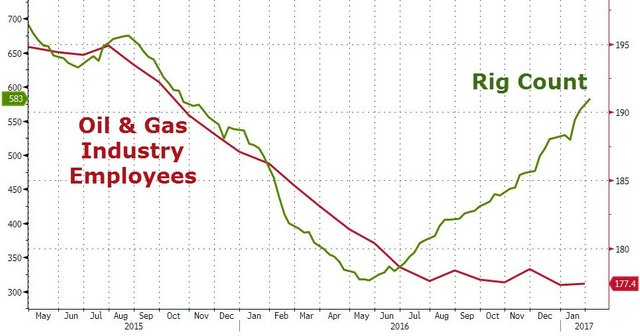 Source: ZeroHedge
Source: ZeroHedge
What should be immediately apparent is that as the number of oil rigs declined due to falling oil prices, so did the number of workers the oil industry employed. But when the number of oil rigs began to climb again, the number of workers didn't even budge and hasn't since. That observation itself should be extremely interesting to anyone debating whether technological unemployment exists or not, but there's even more to glean from this chart.
First, have you even heard of automated oil rigs, or are they new to you? They're called "Iron Roughnecks" and they automate the extremely repetitive task of connecting drill pipe segments to each other as they're shoved deep into the Earth.
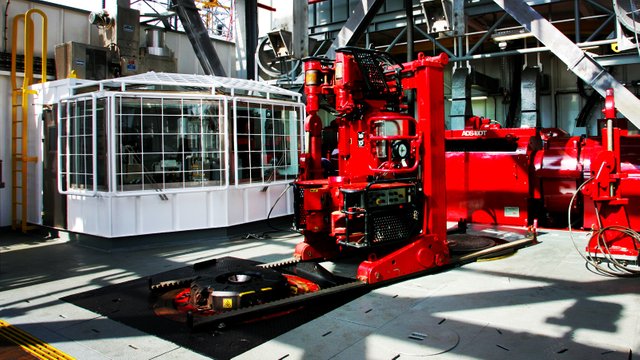 Pictured: National Oilwell Varco's AR3200 Automated Iron Roughneck
Pictured: National Oilwell Varco's AR3200 Automated Iron Roughneck
Thanks to automated drilling, a once dangerous and very laborious task now requires fewer people to accomplish. Automation of oil rigs means that one rig can do more with fewer workers. In fact, it's expected that what once took a crew of 20 will soon take a crew of 5. The application of new technologies to oil drilling means that of the 440,000 jobs lost in the global downturn, as many as 220,000 of those jobs may never come back.
Now look back at the chart again, and notice how quickly this all happened. It took TWO YEARS. How did it happen so fast? Because the oil industry didn't really need the workers it lost in the first place. It's the oil industry. It's used to making lots of money, and when you're making money hand over fist, you don't need to focus on efficiency. Being lean and mean is not your concern. However, that changes when times get tough, and times got very tough for the oil industry as oil prices plummeted thanks to new competition from yet another technological advancement - fracking.
So once it became important to increase efficiency, that's exactly what the oil industry did. It let people go and it invested in automation. In the summer of 2016, oil prices were no longer under $30 per barrel, and had gone back up to around $50 per barrel where they remain. That's half of the $100 per barrel they'd gotten used to, which is fine as long as they're able to produce at twice the efficiency. As a result, like a phoenix rising, they emerged transformed. Oil rigs returned to drilling, but all the rig workers didn't. Those who were let go became simply unnecessary overhead.
Wake Up Call
This is a story of technological unemployment that is crystal clear, and yet people are still arguing about it like it's something that may or may not happen in the future. It's actually a very similar situation to climate change, where the effects are right in our faces, but it's still considered a debate. Automation is real, folks. Companies are actively investing in automation because it means they can produce more at a lower cost. That's good for business. Wages, salaries, and benefits are all just overhead that can be eliminated by use of machines.
But hey, don't worry, right? Because everyone unemployed by machines will find better jobs elsewhere that pay even more... Well, about that, that's not at all what the history of automation in the computer age over the past 40 years shows. Yes, some with highly valued skills go on to get better jobs, but they are very much the minority. Most people end up finding new paid work that requires less skill, and thus pays less. The job market is steadily polarizing.
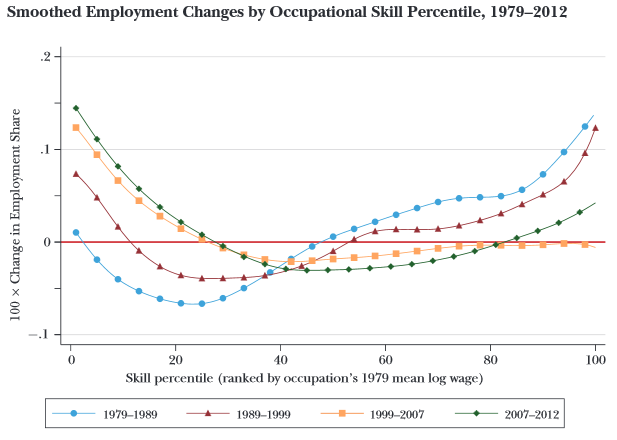
Decade after decade, medium-skill jobs have been disappearing, and decade after decade, the unemployed have found new employment in new low-skill jobs. People unemployed by machines still require income, so they end up finding what they can get. At the same time, they are competing against others doing the same thing as long as the labor market remains involuntary, and thus people are bidding down their own wages and taking any job they can get in a race against the machines. As an added bonus, the jobs being automated are more productive jobs than the jobs being created for most people to move to, resulting in a "paradoxical" deceleration of productivity growth. Long story short, the middle of the labor market is disappearing. That's the reality, and it's been happening for decades.
Only recently are people beginning to really talk about the potential dangers of automation reducing the incomes of large percentages of the population. In the US, the most cited estimate is the loss of half of all existing jobs by the early 2030s. It's great that this conversation is finally beginning, but most people have no idea that it's already happening. And about half of those people who know it's happening, are relying on magical thinking to support their beliefs that automation is of no concern. To the contrary, it is of massive concern.
One of the most telling statistics I've come across is how almost everyone in the US knows we've lost manufacturing jobs over the past three decades. 81% know that very real fact according to a poll of over 4,000 adults by Pew Research. What few people know is that at the same time the total number of jobs has decreased, total manufacturing output has increased. The US is manufacturing more now than it ever has, and only 35% of the country knows that. The percentage of Americans who know both of the above facts are true is a mere 26%.
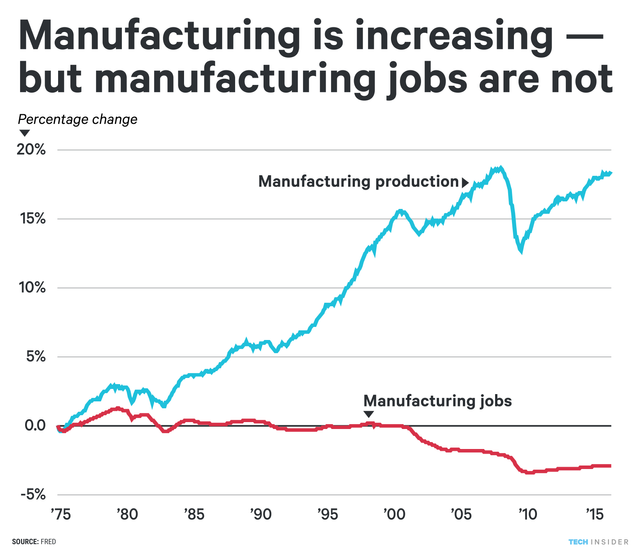 Source: Business Insider
Source: Business Insider
Only one out of every four Americans knows that thanks to technology, we're producing as a country far more with less. Most people don't know that, or blame things like immigrants or offshoring for job losses, even though offshoring is only possible due to technology improvements and only accounts for 13% of manufacturing job loss. That's a problem. We can't make the changes we need to make if people aren't aware the problem exists, or think the existence of the problem is something to be debated. We can't agree on solutions like unconditionally guaranteeing everyone a basic income as a rightful productivity dividend if people are actively being unemployed by growing productivity and the discussion is framed as a future danger to our social fabric instead of a clear and present danger.
Consider this. What happens when the next recession hits? Falling oil prices simulated a recession in the oil industry, which responded with mass unemployment and investment in automation. What happens when all industries respond with mass unemployment and investments in automation? If we look at recent history, each successive downturn has resulted in the permanent shrinkage of the labor market. Peak labor happened in the year 2000.
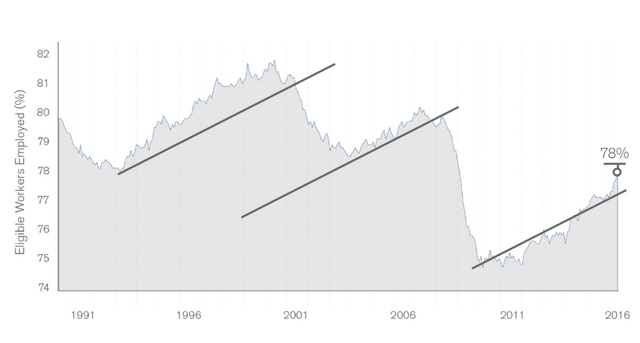 Source: Janus Capital
Source: Janus Capital
Meanwhile, technology is only getting cheaper, so each successive drop squeezes out more human labor that has become more expensive than machine labor. Expect the next recession to put over ten million of people out of work, and for the economy to realize they didn't really need those people as workers after all to produce what was being produced. Where 79% of eligible workers aged 25-54 were employed, expect that to fall to 69% or below. The economy simply doesn't need the number of people it currently employs with the technology we already have available. To add insult to injury, it's taking longer and longer for the unemployed to find new employment, so those suffering next will suffer for a greater amount of time.
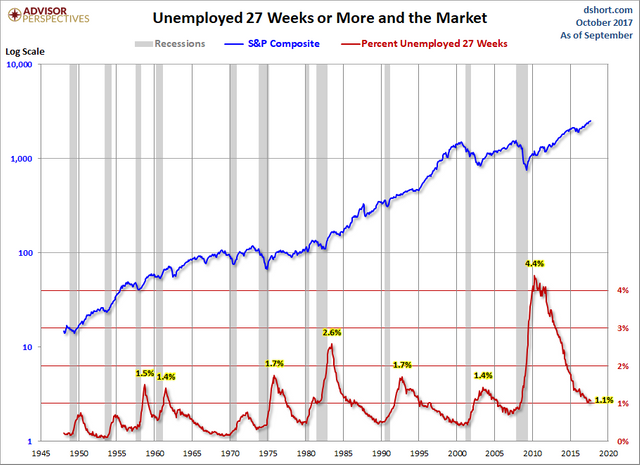 Source: Advisor Perpsectives
Source: Advisor Perpsectives
On the flip side, the other thing to understand is that as technology enables businesses to hire fewer workers, that means to obtain "full employment", where everyone who wants a job has a job, the economy requires that everyone work shorter workweeks, or else an ever growing number of businesses is needed in order to employ the same amount of people. If the average amount of people the average business employs is 10, it would take 10 businesses to employ 100 people. If technology allows 1 person to do the work of 10, the average people a business employs drops to 1, so the number of businesses needed to employ everyone grows to 100.
So is that happening? No. That's not happening. The reverse is happening. New business creation is slowing, not accelerating.
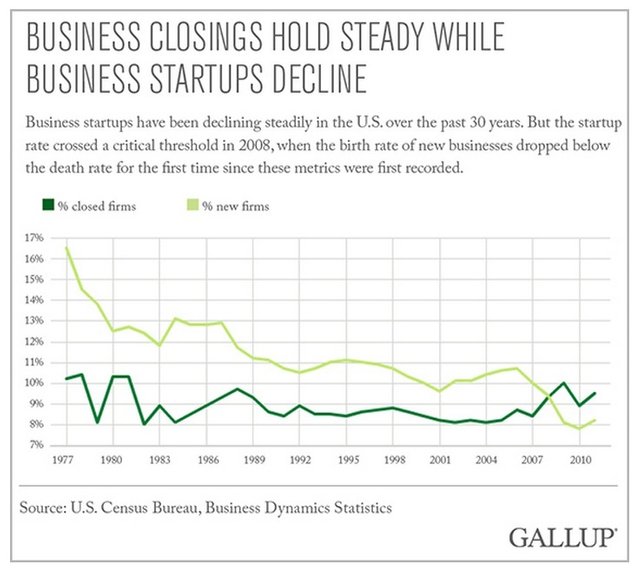
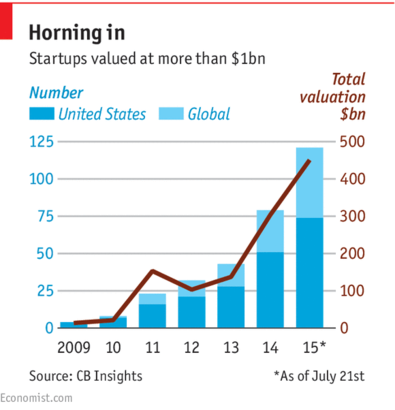
But the new businesses being created are rising in value every year, which matches what we'd expect to see from each new business using the latest technology to do more with less. Every year there are more new businesses worth over $1 billion. Look at Tesla versus early 20th century Ford Motors, or Instagram versus Kodak, or Facebook versus all the newspapers that used to exist. These companies are worth hundreds of billions of dollars and employ a fraction of the people as the most valued companies of the past once did.
Now, let me ask you a question. How much all of the above information were you already fully aware of, to the point none of it was new to you? Now ask yourself why? Automation clearly exists, and clearly is already affecting the economy. So why is the debate about automation even a debate at all? That's perhaps the scariest thing about the oil rig automation chart, along with the rest of the charts I've included here, the fact existing evidence is not part of the debate. Just as climate change has been something we've debated for decades while the effects have only grown more extreme, so too is automation being denied as it grows more extreme.
My fear is that ignoring the problem will continue. Why not? We've ignored the auto industry being automated. Yes, we know it happened, but we've pretended that everyone just went on to find new paid work, without critically evaluating the nature of that paid work. Unemployment isn't a problem, right, because the unemployment rate is at a record low? Tell that to the person who went from a 40-hour per week job with benefits and a sense of security to three different jobs without any benefits, working 80 hours per week to earn less total income in a far more insecure life just trying to get by each month. Tell that to the person who attempted suicide, or self-medicated their depression with opioids after their town's manufacturing plant closed down, obliterating their town's local economy and leaving them with no means of paying others for their own existence.
Technological unemployment is real.The only honest debate to be had is over the nature of re-employment, and all evidence points to a growth in low-skill jobs, a transition to alternative work arrangements like temporary and "gig" labor, rising variance in monthly incomes, erosion of benefits, longer terms of unemployment, and what can only be called a pandemic of economic insecurity as survival, instead of the American Dream, increasingly becomes the primary goal of the majority of Americans.
Meanwhile, some other Americans are doing extremely well. Why? Because they own the machines. They own the lobbyists. They write the laws. They write the tax code. They have the power. And so they are the sole beneficiaries of the machine labor producing greater and greater amounts of national wealth, where once that wealth was more widely shared with those producing it.
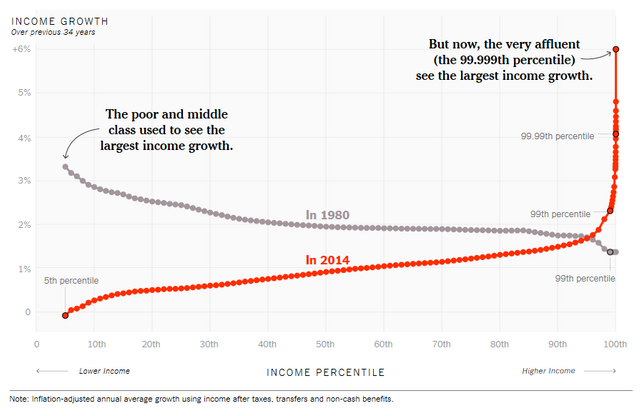
Hundreds of thousands of jobs were just lost due to oil rig automation and no one (except for those unemployed and their families) batted an eye. Hundreds of thousands more jobs were just lost in retail due to the unstoppable efficiency of Amazon and the more than one hundred thousand robots it employs. And yes, Amazon is creating lots of new jobs, but for every job it creates, it has eliminated two or more by eliminating its less efficient brick and mortar competition. Unless you're talking about net job creation, and the details of those jobs created, you're not talking about job creation.
The question is, at what point will enough people recognize that automation is a real problem that must be confronted immediately. When millions of trucking jobs are automated? When millions more retail jobs are automated? How many jobs need to be erased before we collectively create the will to do something? And at what point will we recognize that the problem of automation should not be a problem at all, and that we want as much work automated as possible? When will we realize that automation is a blessing, not a curse, and that the benefits of machine labor should be spread across all of society instead of concentrated in the hands of a relative few? And when will the relative few realize that although they no longer need laborers, they still need consumers?
I hope that time is soon, very soon, because I look around at our reality, and I wonder if we're going to get our shit together before it's too late, if it isn't already. As long as we force each other to work for money in order to live, automation will work against us instead of for us. It is a civilizational imperative that we decouple income from work. Without an unconditional basic income, the future is a very dark place. With unconditional basic income, especially one that rises as productivity rises as a rightful share of an increasingly automating economy, the future is finally a place for everyone.
This is an earlier shorter version of an article I just published on Medium. If you'd like to read the longer version, with even more graphs, please click here.

I see you talking about universal basic income a lot, but I think UBI is actually closer to a trap.
As the workers have less incentive to keep their specific job, as they have a buffer where they can find a new one, unions will become less important. As unions and keeping a specific job becomes less important, wages will go down. As wages go down the economy starts to stagnate, and then they blame UBI. Once they take away or lower UBI, all wages will have gone down significantly. Only the rich win in that situation too, ethical capitalism can not exist.
Wages for important jobs will have to go up, as employees are in a much stronger position as they can safely turn down jobs as they have a guaranteed safety net.
Wages might go up in the short term because of that, but they will ultimately crash down. If somebody can afford to turn down a job, they can afford to quit their own. That destroys unions and all chances the workers as a group have for higher wages. That puts them in a massively weaker position, especially once they can no longer live off of the basic income because of the economic downturn this causes.
It won't destroy unions. It will replace certain functionalities of unions. And not getting money into the hands of consumers is the fastest way to destroy an economy.
"And not getting money into the hands of consumers is the fastest way to destroy an economy."
since the workers do not need jobs, and unions will be destroyed, jobs will start paying less (since they will be considered "optional extra income", and that will be abused heavily.)
This is a non-sequitur. It doesn't address the point that without getting money into the hands of consumers, capitalism will fail. Most opponents of UBI never address this point. They refuse to face the reality of the decimation of human employment by technology.
Capitalism will fail either way lmao
"It won't destroy unions. It will replace certain functionalities of unions. "
if nobody has a reason to join unions they will collapse, unions require the vast majority of workers to be in them to function well. If the majority of people are ok with quitting and just waiting for another higher paying job to open up, nobody will be fighting to keep the jobs higher paying. Once that happens the economy will start declining as spending money and production will go down. This will be blamed on the basic income, leading to it being removed. All that will be left are the jobs with wages pushed down and more workers competing for them.
If the functionality of unions is replaced, then you don't need unions. Wages won't go down if there aren't people to do the jobs. This is basic supply and demand. UBI gives employees great strength, as they don't have to make the choice between shit jobs with shit pay and starvation. If employers want to retain employees, they will have to provide better working conditions and good pay. This idea that wages will fall is nonsensical.
Actually tbh it doesn't matter, the tendency of the rate of profit to fall is all i need.
Withoutorganization the workers are subject to manipulation. As soon as profits fall and the decline accelerates the economic downturn will cause them to blame ubi, which wouldn't be enough to survive on after that. With the massive amount of workers fighting for basic survival and the unions destroyed, wages will reach an all time low. So nvm again, i guess ubi will save capitalism in the short term
i didn't actually change my opinion i just said everything again as i have a feeling you didn't read it
Wonderful post Scott. You really spelled out the facts of the changes automation is bringing well. I will be sharing this piece with a few people.
Thank you, and thanks for reading and sharing!
Thank you. I read the article on Medium and I was impressed. To me the graph of manufacturing jobs versus production is the most powerful. Politicians in Australia are still talking about increased productivity as a path to prosperity, but not for workers it seems.
img credz: pixabay.com
Nice, you got a 8.0% @minnowbooster upgoat, thanks to @scottsantens
Want a boost? Minnowbooster's got your back!
The @OriginalWorks bot has determined this post by @scottsantens to be original material and upvoted it!
To call @OriginalWorks, simply reply to any post with @originalworks or !originalworks in your message!
For more information, Click Here!
Special thanks to @reggaemuffin for being a supporter! Vote him as a witness to help make Steemit a better place!
the tenancy for the rate of profit to fall
This post has received a 1.99 % upvote from @booster thanks to: @scottsantens.
@minnowpondred has voted on behalf of @minnowpond.
If you would like to recieve upvotes from minnowponds team on all your posts, simply FOLLOW @minnowpond.
Nice
Congratulations! This post has been upvoted from the communal account, @minnowsupport, by scottsantens from the Minnow Support Project. It's a witness project run by aggroed, ausbitbank, teamsteem, theprophet0, someguy123, neoxian, followbtcnews/crimsonclad, and netuoso. The goal is to help Steemit grow by supporting Minnows and creating a social network. Please find us in the Peace, Abundance, and Liberty Network (PALnet) Discord Channel. It's a completely public and open space to all members of the Steemit community who voluntarily choose to be there.
This wonderful post has received a bellyrub 7.08 % upvote from @bellyrub thanks to this cool cat: @scottsantens. My pops @zeartul is one of your top steemit witness, if you like my bellyrubs please go vote for him, if you love what he is doing vote for this comment as well.